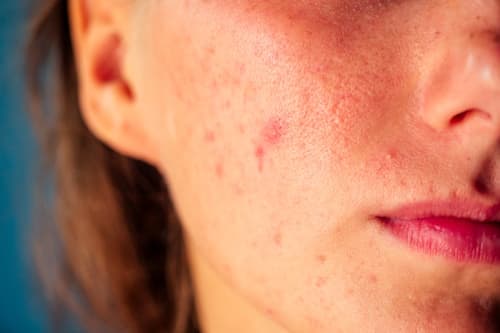In the ever-evolving world of skincare, essential oils have gained a spotlight. Rosemary oil is often hailed for its numerous benefits. Using rosemary oil for acne has been a topic of interest among skincare enthusiasts.
However, is this natural remedy truly a boon for those battling acne, or does it carry hidden drawbacks? This blog post delves into four reasons why rosemary oil might not be ideal for acne treatment and skincare.
Also read: How to choose the best acne treatment
Biggest Take-Aways:
- Rosemary oil can cause skin irritation and allergic reactions, particularly in sensitive individuals.
- The oil may aggravate certain skin conditions like eczema rather than soothe them.
- Using rosemary oil for acne can be counterproductive, as it might clog pores and worsen breakouts.
- Exposed Skin Care provides a more reliable and gentle solution for acne management, combining scientific and natural elements for effective treatment.

Reason 1: Potential for Skin Irritation and Allergic Reactions
Understanding the Nature of Essential Oils
Before diving into the specifics of rosemary oil, it's essential to understand the general properties of essential oils. These concentrated plant extracts are potent and can cause adverse reactions, particularly in people with sensitive skin.
Rosemary Oil's Impact on Sensitive Skin
- Irritation and Redness: For individuals with sensitive skin, topical rosemary oil can lead to irritation. Symptoms can include redness, itching, and discomfort.
- Allergic Reactions: Essential oils, including rosemary, can trigger allergic responses. These reactions might manifest as rashes or even more severe skin conditions.
- Patch Test Recommendation: It's always advised to perform a patch test, typically on the inside of your elbow, before fully incorporating rosemary oil into your skincare routine.

Reason 2: May Worsen Certain Skin Conditions Like Eczema
Rosemary Oil's Interaction with Skin Conditions
Rosemary oil is known for its antimicrobial and anti-inflammatory properties, but its effects on skin conditions like eczema or rosacea can be counterproductive.
- Aggravation of Symptoms: In some cases, applying rosemary oil can exacerbate the symptoms of eczema or rosacea, leading to increased dryness, irritation, and redness.
- Balance of Oil Production: While rosemary oil can help regulate oil production, its effectiveness varies greatly depending on the individual's skin type. For those with naturally oily skin or conditions like eczema, it might disrupt the skin's natural balance.
Reason 3: Risk of Exacerbating Acne Breakouts
Rosemary Oil and Acne-Prone Skin
The idea of using rosemary oil for acne hinges on its antibacterial and anti-inflammatory properties. However, this doesn't always translate to positive results for acne-prone skin.
- Clogging Pores: Like many oils, Rosemary oil can potentially clog pores. This can lead to further acne breakouts, especially in individuals with acne-prone or oily skin types.

- Bacteria Living on Your Skin: While rosemary oil has antibacterial properties, its efficacy against the specific bacteria causing acne is not universally acknowledged.
- Inflammation Beneath the Skin: Rosemary oil might soothe surface-level inflammation but may not effectively reach or treat inflammation beneath the skin, which is crucial in managing acne.
Reason 4: Interference with Other Skincare Products
The Complexity of Skincare Routines
Incorporating rosemary oil into an existing skincare routine requires careful consideration, as it can interact with other products.
- Compatibility with Other Ingredients: Rosemary oil may not be compatible with certain skincare ingredients, potentially diminishing their effectiveness or causing adverse reactions.
- Layering of Products: When adding rosemary oil to a skincare regimen, it's important to understand how it layers with other products. Incorrect layering can lead to reduced benefits and increased risks of irritation.
- Dilution Is Key: To mitigate some of its potency, dilute rosemary oil with a carrier oil, like jojoba or grapeseed oil. However, the dilution process and the choice of carrier oil can further complicate its use in a skincare routine.
The Advantages of Exposed Skin Care for Managing Acne
In contrast to rosemary essential oil for acne, Exposed Skin Care offers a more balanced and targeted approach to acne management. This skincare line is designed with a blend of scientific and natural ingredients, offering a comprehensive solution for those with acne.
Here are the benefits of Exposed Skin Care:
- Targeted Acne Treatment: Exposed Skin Care is specifically formulated to combat acne, using ingredients that directly address acne bacteria and excess oil production.
- Incorporation of Natural Elements: While rosemary essential oil is used cautiously, Exposed Skin Care integrates other natural components known for their skin benefits.
- Antioxidant Protection: The products often contain antioxidants, which help protect the skin against damage from free radicals, contributing to a more even skin tone and reducing the appearance of fine lines.
- Reduced Skin Inflammation: Its formulations are designed to reduce puffiness and inflammation, common issues in acne-prone skin.
- Gentle on the Skin: Unlike applying rosemary essential oil topically, which can be harsh for some, Exposed Skin Care products are generally gentler and suitable for various skin types.
- Additional Benefits: Beyond treating acne, some products in the line offer aromatherapy benefits, enhancing the skincare experience and contributing to overall well-being.
Exposed Skin Care thus presents a well-rounded, effective option for managing acne, blending the best of science and nature.
Conclusion
While rosemary extract and the benefits of rosemary oil have been celebrated in various contexts, from soothing dry skin to promoting hair growth, its application in acne management requires careful consideration.
People have used rosemary for its natural healing properties for centuries, yet its direct use on skin, especially for acne, brings forth challenges. The constituents of rosemary oil, such as rosmarinic acid, are known to soothe the skin and provide antioxidant properties.
However, the effects of rosemary oil can sometimes irritate and exacerbate skin conditions. This highlights the importance of understanding the best ways to use rosemary oil for your skin, ensuring it doesn't harm your complexion or aggravate existing skin issues.
Products like Exposed Skin Care can offer a safer alternative for those seeking a more balanced approach to managing acne. They combine the benefits of natural ingredients and scientific formulations, aiming to protect the skin against harmful elements while nurturing healthy skin.
This approach can help with the appearance of acne scars and promote an even skin tone without the risk of getting into your pores and causing further issues.
FAQs
Can Rosemary Oil Cause Skin Irritation?
Yes, rosemary oil can cause skin irritation, especially in individuals with sensitive skin or specific skin conditions like eczema.
Is Rosemary Oil Effective for Treating Acne?
While rosemary oil has antibacterial and anti-inflammatory properties, its effectiveness for acne treatment varies and can sometimes exacerbate acne symptoms.
Can Rosemary Oil Worsen Eczema?
Yes, rosemary oil can potentially worsen the symptoms of eczema, causing increased dryness, irritation, and redness.
How Should Rosemary Oil Be Used in a Skincare Routine?
Rosemary oil should be diluted with carrier oil and used cautiously, especially for sensitive or acne-prone skin. It's also important to consider its compatibility with other skincare products.
What Are the Benefits of Using Exposed Skin Care for Acne?
Exposed Skin Care offers a targeted acne treatment that blends scientific and natural ingredients. It's generally gentler on the skin and provides antioxidant protection, helping manage acne without causing excessive dryness or irritation.



















